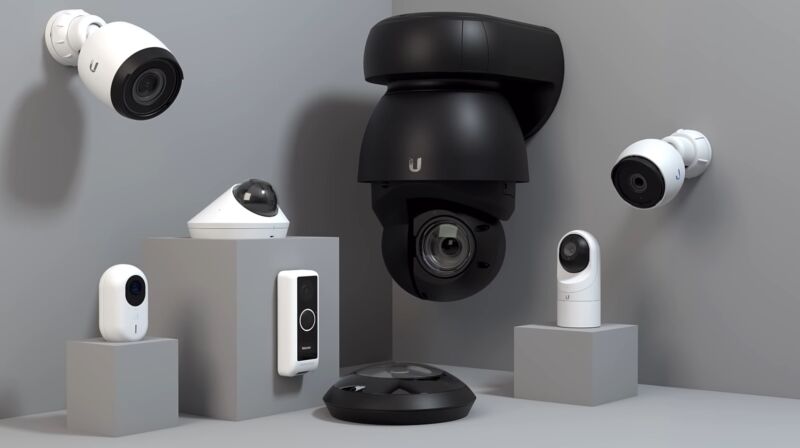
Users of UniFi, the popular line of wireless devices from manufacturer Ubiquiti, are reporting receiving private camera feeds from, and control over, devices belonging to other users, posts published to social media site Reddit over the past 24 hours show.
“Recently, my wife received a notification from UniFi Protect, which included an image from a security camera,” one Reddit user reported. “However, here’s the twist—this camera doesn’t belong to us.”
Stoking concern and anxiety
The post included two images. The first showed a notification pushed to the person’s phone reporting that their UDM Pro, a network controller and network gateway used by tech-enthusiast consumers, had detected someone moving in the backyard. A still shot of video recorded by a connected surveillance camera showed a three-story house surrounded by trees. The second image showed the dashboard belonging to the Reddit user. The user’s connected device was a UDM SE, and the video it captured showed a completely different house.
Less than an hour later, a different Reddit user posting to the same thread replied: “So it’s VERY interesting you posted this, I was just about to post that when I navigated to unifi.ui.com this morning, I was logged into someone else’s account completely! It had my email on the top right, but someone else’s UDM Pro! I could navigate the device, view, and change settings! Terrifying!!”
Two other people took to the same thread to report similar behavior happening to them.
Other Reddit threads posted in the past day reporting UniFi users connecting to private devices or feeds belonging to others are here and here. The first one reported that the Reddit poster gained full access to someone else’s system. The post included two screenshots showing what the poster said was the captured video of an unrecognized business. The other poster reported logging into their Ubiquiti dashboard to find system controls for someone else. “I ended up logging out, clearing cookies, etc seems fine now for me…” the poster wrote.
Yet another person reported the same problem in a post published to Ubiquiti’s community support forum on Thursday, as this Ars story was being reported. The person reported logging into the UniFi console as is their routine each day.
“However this time I was presented with 88 consoles from another account,” the person wrote. “I had full access to these consoles, just as I would my own. This was only stopped when I forced a browser refresh, and I was presented again with my consoles.”
Ubiquity on Thursday said it had identified the glitch and fixed the errors that caused it.
“Specifically, this issue was caused by an upgrade to our UniFi Cloud infrastructure, which we have since solved,” officials wrote. They went on:
1. What happened?
1,216 Ubiquiti accounts (“Group 1”) were improperly associated with a separate group of 1,177 Ubiquiti accounts (“Group 2”).
2. When did this happen?
December 13, from 6:47 AM to 3:45 PM UTC.
3. What does this mean?
During this time, a small number of users from Group 2 received push notifications on their mobile devices from the consoles assigned to a small number of users from Group 1.
Additionally, during this time, a user from Group 2 that attempted to log into his or her account may have been granted temporary remote access to a Group 1 account.
The reports are understandably stoking concern and even anxiety for users of UniFi products, which include wireless access points, switches, routers, controller devices, VoIP phones, and access control products. As the Internet-accessible portals into the local networks of users, UniFi devices provide a means for accessing cameras, mics, and other sensitive resources inside the home.
“I guess I should stop walking around naked in my house now,” a participant in one of the forums joked.
To Ubiquiti’s credit, company employees proactively responded to reports, signaling they took the reports seriously and began actively investigating early on. The employees said the problem has been corrected, and the account mix-ups are no longer occurring.
It’s useful to remember that this sort of behavior—legitimately logging into an account only to find the data or controls belonging to a completely different account—is as old as the Internet. Recent examples: A T-Mobile mistake in September, and similar glitches involving Chase Bank, First Virginia Banks, Credit Karma, and Sprint.
The precise root causes of this type of system error vary from incident to incident, but they often involve “middlebox” devices, which sit between the front- and back-end devices. To improve performance, middleboxes cache certain data, including the credentials of users who have recently logged in. When mismatches occur, credentials for one account can be mapped to a different account.
In an email, a Ubiquiti official said company employees are still gathering “information to provide an accurate assessment.”
https://arstechnica.com/?p=1991239

